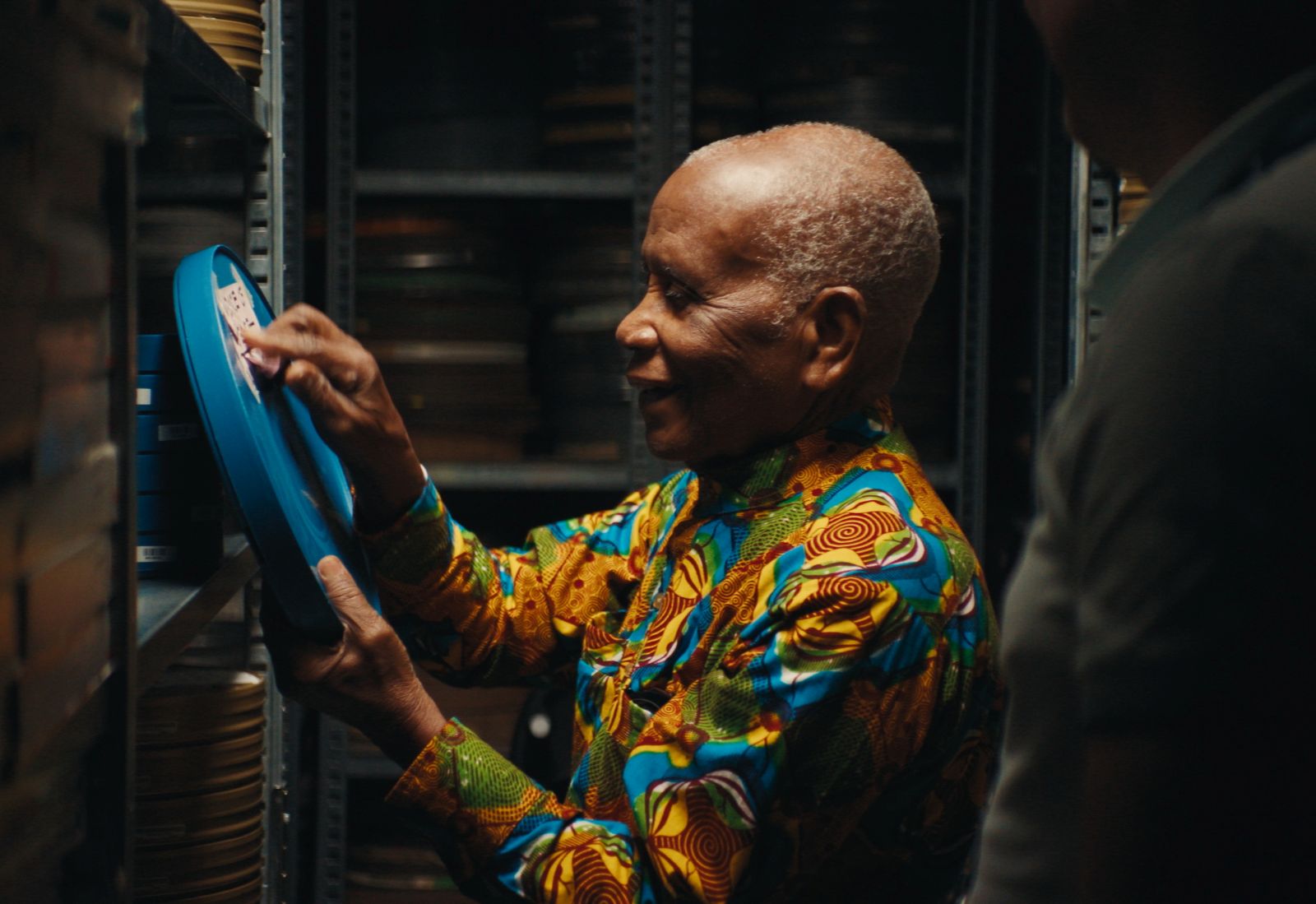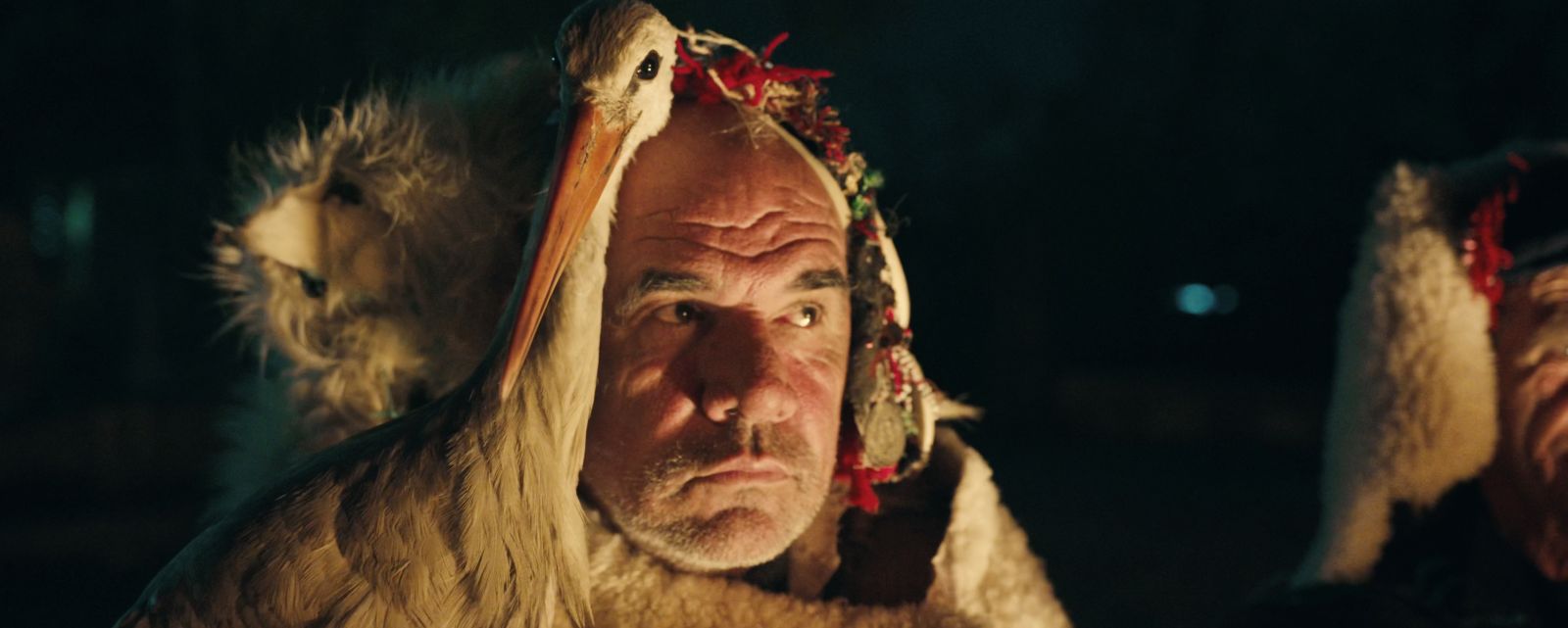The Eyes of Ghana
(USA, 90 min.)
Dir. Ben Proudfoot
Programme: TIFF Docs (World premiere)
“Just because you don’t know the story doesn’t mean it never happened,” Reverend Chris Hesse says in The Eyes of Ghana. The veteran documentarian looks the power of recorded history in the eye and conveys what it means to capture the lives of one’s countrymen on film. As the nonagenarian cameraperson fixes his eyes on the Interrotron trained upon him by two-time Oscar winner Ben Proudfoot, one gets the sense of a meeting of the minds locking eyes indirectly via the technical handiwork of Errol Morris. Having two great filmmakers match each other’s brainwaves makes this excavation of cinematic history a deeply moving examination of the power of documentary films. It’s an exceptional human portrait with a wider lens.
Proudfoot finds one of his better subjects here in Hesse with his weathered face and eyes displaying the signs of glaucoma remembers. After mastering the short form profile in Oscar winners The Queen of Basketball and The Last Repair Shop, Proudfoot’s return to features after a decade on the shorts beat does him well. The Eyes of Ghana resembles the taller cousin of The Queen of Basketball as it follows a similar structure with its direct address interviews framed lovingly in Academy ratio close-up buttressed with some great archival footage to give a historical figure his due.
Much like Basketball’s Lusia Harris, Ghana’s Chris Hesse has a magnetic close-up here. He’s an energetic soul even in his ninth decade. His memory’s sharp as a pin and his wit is quick as he looks back at his history as a nation’s chronicler. Hesse tells how he spent years following Kwame Nkrumah when he was prime minister of the land known then as the Gold Coast.
The filmmaker’s work captures a history of decolonial progress as Nkrumah successfully campaigned for his country’s liberation from British colonial rule, and then fought for all of Africa to be free as Ghana’s first president. But when a coup d’état displaced Nkrumah and thwarted his dream of creating the United States of Africa, Hesse shares how the new ruling party erased all records of Nkrumah’s tenure, including countless reels documenting daily life in the country.
However, wily figure that he is, Hesse looks into the camera with a twinkle in his eye: “What they didn’t know was that the negatives were in London.” He smiles, and proceeds to tell his story.
The Eyes of Ghana follows Hesse’s twofold mission to keep Ghana’s eyes fresh. He knows that the final reel of his own life is spinning at 24 frames per second, and he imparts his wisdom to a new generation. Young Ghanaian filmmaker Anita Afonu serves as his protégé among the many students learning the craft from the master. The film features Afonu in direct address too as she offers her own perspectives on Hesse’s images and impact.
Education proves a running theme in the film as Hesse teaches his students that light equals knowledge. To shed light, Hesse explains, means to teach, education, and provide new information with which people can better understand the world. Each time one adjusts the exposure, shifts the focus, and puts light to celluloid, one illuminates the audience receiving the images projected on screen.
Hesse’s own aptitude for illumination appears in the chief thread in which the negatives housed in London get overdue restorations. Approximately 15 minutes’ worth of Hesse’s 1,300 surviving reels receive striking renewals in The Eyes of Ghana. The independent production—it’s not simply a movie that documents the restoration as a means to pay for it—offers valuable visual evidence of the role that film played in Ghana’s liberation from colonial rule.
Moreover, Hesse’s testimony relates a history of growing up with racist images. Gross caricatures and Sambo-style cartoons from the archives illustrate the ways the Brits depicted Black life in demeaning and derogatory ways as an expression of power. “It was racism of the highest order!” Hesse recalls passionately.
There’s still fire in his voice decades later. But he tells how picking up a camera and trailing Nkrumah allowed him to capture Ghanaians of all kinds. Afonu’s perspectives complement this tale as she presents herself as living proof of the power of counter-narratives and corrective lenses. She wants to carry this history of self-representation forward having understood its own role in Ghana’s liberation.
Hesse, who was most often the only Black cameraperson on the press line, looks back at his life as a nation’s chronicler with well-earned pride. He illuminates his rapport with Nkrumah and imparts how the leader also served as director. If Nkrumah wagged his walking stick a certain way, Hesse explains, he might want his chronicler to stop rolling. Other cues might mean, “Get this!” Nkrumah, like Hesse, displays a firm understanding in the power of cinema to education.
The Eyes of Ghana unfolds with a strong dramatic twist as Nkrumah’s drive for power and control leads to rebellion. Hesse’s camera keeps rolling as Ghanaians turn sour on their leader and find his rule increasingly despotic. Images of celebration yield to portraits of unrest.
The film therefore straddles a complicated portrait of a documentarian’s relationship to his subject and audience alike. Hesse still speaks fondly of Nkrumah even though the latter part of his presidency overshadows the formative, progressive years. He doesn’t aim to erase arguments that Nkrumah was a dictator. Nor does he seek to affirm them. Without looking back at history with rose coloured glasses, he speaks affectionately of a colleague who inspired him to use his camera as a tool for liberation. Hesse recalls that Nkrumah’s final words to him were, “Never stop filming.” He shares that this sage advice came when Nkrumah sensed something in the air and knew a coup was coming.
The Eyes of Ghana plays the complementary threads about illumination off one another when a student asks Hesse about Nkrumah’s record. Hesse says it’s not for him to judge. He simply records history and lets images speak for themselves. It’s a compelling endnote that invites one to leave The Eyes of Ghana with an appreciation for Hesse’s legacy for objective filmmaking. It’s also an open interpretation to consider documentary’s role and the different responsibilities one has across the production process, from the person who shoots the footage to the hands that edit it and the director who narrativizes it.
Proudfoot’s hand displays a strong grasp for the latter roll as he takes Hesse’s images and riffs on the theme of restoration in a vérité thread about the renewal of the Rex Theatre in Ghana’s capital, Accra. Edmund Addo, the cinema’s proprietor—another terrific storyteller in a film full of great raconteurs—reminiscences about the glory days of projecting reels to the masses.
As interviews with Hesse, Afonu, and Addo tell about the power of seeing oneself on screen, a chorus of hands declutters and refurbishes the Rex, including resurfacing the large outdoor screen, to rekindle the shared cinematic experience.
Beautifully shot by Brandon Somerhalder and David Feeney-Mosier, the vivid colours of the Rex Theatre provide a vibrant canvas and sense of renewal. The neglected theatre receives a facelift with hopes of showing Hesse’s restored works to a new generation of Ghanaians. As the score by Proudfoot’s frequent collaborator Kris Bowers swells well an audience looks up at the images projected on screen, one sees the significance of this history—the good and the bad—in every frame.















